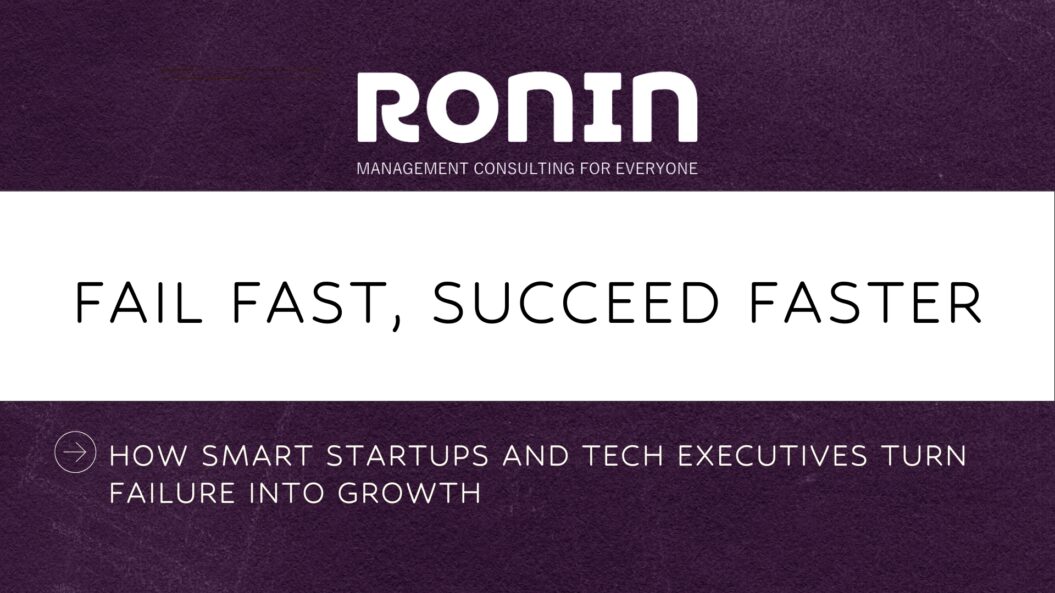Failure can feel like the ultimate setback. For the most successful entrepreneurs, failure is not a dead-end—it’s a learning tool. The “Fail Fast” methodology, embraced by forward-thinking executives, accelerates growth by encouraging rapid experimentation, quick decision-making, and continuous learning.
1. The Power of Failing Fast
Failing fast doesn’t mean seeking failure for its own sake. It’s about taking calculated risks, testing ideas quickly, and learning from small, controlled failures. The tech industry thrives on innovation, but with innovation comes uncertainty. The sooner you test an idea, the quicker you’ll discover what works—and more importantly, what doesn’t.
By embracing failure as a necessary part of the process, startup executives can reduce costly mistakes down the line. A quick pivot from a failed product feature, marketing strategy, or business process can save valuable time and resources.

2. Minimizing Risk While Failing Fast
Many startups fear failure because of the potential risks involved—lost time, wasted investment, and reputation damage. But failing fast actually minimizes risk. Here’s how:
– Small Stakes, Big Learnings: When failures are identified early, the investment (time, capital, or resources) is small. This reduces the financial hit and emotional strain.
– Rapid Pivoting: If an idea or feature isn’t working, quick failure allows for fast course correction. Startups that master the art of pivoting increase their odds of finding the right path to product-market fit.

3. Building a Culture of Innovation
Startups that encourage a culture of failing fast are more likely to foster innovation. Teams feel empowered to take risks and experiment, knowing that failure is part of the journey. A company culture that doesn’t fear failure but instead values learning from it is one that drives innovation forward.
Encouraging cross-functional teams to test new approaches without fear of blame or punishment creates a dynamic environment where creativity can thrive.

4. Learning from Failure: Key to Long-Term Success
Some of the most iconic tech companies were built on the back of early failures. From Tesla’s manufacturing challenges to Slack’s pivot from a failed gaming platform, failure is often the necessary stepping stone to lasting success.
When failures occur, executives must ask the right questions:
– What went wrong?
– What can we learn?
– How can we improve?
This type of reflection, followed by action, ensures that each failure moves the company closer to its goals.

5. Failing Fast with the Right Processes
The key to failing fast is having the right systems in place to quickly test, fail, learn, and repeat. Executives can ensure that their teams are set up to fail fast by implementing:
– Agile frameworks: Small, iterative product releases provide constant feedback loops.
– Clear metrics for success and failure: Teams should know exactly what a “failure” looks like to make informed decisions.
– Data-driven decision-making: Every failure is an opportunity for data collection and analysis. Use this data to inform future strategies.
Working with experienced advisors or consultants can help identify weak points in your business processes and provide the tools to integrate this “fail fast” philosophy effectively.

Failing Fast is the Future
Failing fast is more than just a strategy—it’s a necessity. Startup executives who master the art of failing fast position their companies for long-term growth by learning from early mistakes, reducing risk, and fostering a culture of continuous innovation.
Ready to incorporate the fail fast mindset into your business? Start by reaching out to RONIN CONSULTING LLC. Message us for a free consultation on how to help your team establish the right process for progressing past failure towards success.

